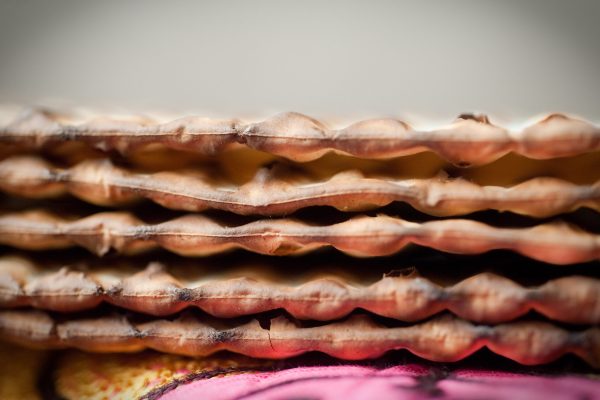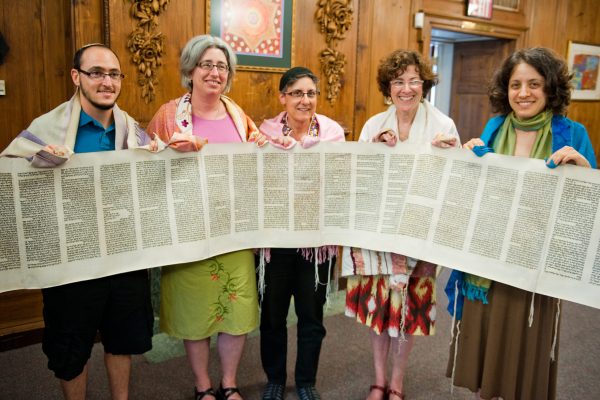ברית אחים/אחוט/משפחה
Chosen family-making has been so core to queer and trans communities, offering us ways to create lasting bonds and to nurture the expansive intimacies we create with each other. For those of us who have separated from our families of origin, for whom chosen family is our only family, it may become important to create some structure around what it means to become and make a chosen family. My brother and I made this “Brother’s Covenant” modeled off of a Brit Ahuvim, a Lover’s Covenant to recognize, structure, and celebrate the chosen family we have made. We are working with an artist to have it created into a ketubah and invite our extended chosen family and friends together to witness and celebrate the family and home we’ve made together. Like all ketubot, it’s infinitely personalizable — add people, change the quotes to ones that are relevant to you, change the promises you are making to each other. We hope it can be a catalyst for others making rituals for chosen-family making, and for building poly ketubot as well.
On ___ (day of week) the ___ day of (month) in 57XX by the Jewish calendar and the ___ (day of week) the ___ day of (month) by the secular calendar, in CITY, in STATE, COUNTRY, HEBREW NAME of PERSON 1 m’beit/bar/bat FAMILY NAME, who is known as SECULAR NAME of PERSON 1 and HEBREW NAME of PERSON 2 m’beit/bar/bat FAMILY NAME, who is known as SECULAR NAME of PERSON 2, confirm a brothers’/sister’s/siblings/family covenant between them in the presence of family and friends. They acknowledge and celebrate the family and home they have created and commit to nurturing together. How good and pleasant it is that brothers dwell together (Ps. 133:1).
The agreement into which PERSON 2 and PERSON 1 are entering is a holy covenant like the ancient covenants of our people to stand forever. It is a covenant of protection and hope like the promise Rahav and the Israelite scouts swore to keep each other safe, knowing their lots were bound up with each other. It is a covenant of vision, intention, and truth, like the charge gave to Avram, saying “go to yourself, out of your land, and out from the place you grew up in, out of your parents’ house, to the place that I will show you” (Breishit 12:1). It is a covenant of commitment and dedication, as Ruth committed to Naomi “Don’t urge me to leave you, to turn back, to not follow you. Wherever you will go, I will go. Wherever you live, I will live. Your people shall be my people” (Ruth 1:16). And it is a covenant of pleasure, sustenance, and joy, as it written “As with fat and marrow, my soul will be satisfied” (Psalms 63:6).
These are the commitments that FULL HEBREW NAME of PERSON 1 and FULL HEBREW NAME of PERSON 2 make to each other:
- PERSON 1 and PERSON 2 declare that they are brothers, that they have formed a family in the spirit and name of their ancestor Rahav, who takes people in and provides protection and care. They commit to building a family that nurtures, loves, protects, and shelters each other, and the family and community they build both separately and together.
- PERSON 2 and PERSON 1 hereby assume all the rights and obligations that apply to family members: to attend, care, and provide for one another. They will prioritize the important times in each of their lives. Each acknowledges the families and bonds that the other brings with them to the family they are building together, and welcome the extended web of family that gets made through their connection.
- PERSON 1 and PERSON 2 commit themselves to nurturing love, generosity, and grace in their home. “Let them talk a lot with each other with love, brotherly love, great affection, and with truth to their truth, from the depth of their heart, without trying to win or irritate” (Likutei Tefilot V 1 27:3). They’ll nurture and support each other’s dreams and explorations and the winding roads life might take. They will unite in their shared values, which will strengthen them. They will honor their differences, which will enrich their bond.
- PERSON 2 and PERSON 1 are building a safe, secure, loving, playful, family home for the first time in each of their lives. They take up this project with full and open hearts, acknowledging that it is both a challenge and a delight. They commit to giving themselves and each other grace to make mistakes, to allow their inner children to grow and flex with them as they learn to settle into home together. They will prioritize connection and repair over perfection, and invite expansiveness and flexibility whenever and however possible.
- PERSON 2 and PERSON 1 commit to sharing their burdens and joys, resources and challenges, and approaching their material realities as a team. To prioritizing the relationship over the material circumstances, and weathering the ups and downs together and within their larger families and communities.
- PERSON 1 and PERSON 2 will hold each other as sacred through the hardest and best of times. They will nurture and protect this bond, and when it is challenged they will hold each other and their relationship with love and care.
- PERSON 2 and PERSON 1 pledge to be loving supports at the time of dying, by carrying out the last requests of the dying brother, protecting him from indignity or abandonment, and by maintaining loving, caring connection until the end, as has been written: Set me as a seal upon your arm, for love is stronger than death (Song of Songs 8:6).
Surrounded by family and friends, they vow to each other with open hearts: your people shall be my people. This sacred covenant is valid and binding











